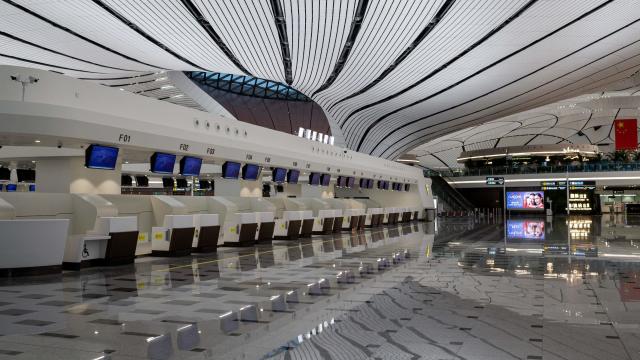New research looking into China’s early containment efforts of the deadly new coronavirus suggests the government’s strict travel restrictions may have bought the world some time, if not China itself. But it also seems that other travel restrictions to affected areas won’t really help prevent the outbreak from spreading further now. More important, the researchers say, will be finding ways to reduce the chances of transmission within our own neighbourhoods and communities.
According to the Chinese government, the very first cases of COVID-19 were reported in late December 2019 around the region of Wuhan. Starting on January 23, the government began enacting travel bans from Wuhan’s international airport, as well as limiting travel from Wuhan to other areas of mainland China. By early February, many airlines had put in place similar bans to and from mainland China in general.
These restrictions didn’t come without criticism from the World Health Organisation and others, while ethicists also feared that China’s wide-scale quarantines of residents also crossed a line.
The researchers behind this new study, which is published Friday in Science, created a model to figure out how these decisions may have affected the course of the outbreak. The model relied on estimated factors like how fast it takes for an infected person to be contagious and the average number of secondary cases caused by that infected person.
It was also adjusted based on a recent tally of reported cases and where the disease has spread. As of March 6, the outbreak has reached 88 countries, with more than 100,000 documented cases and nearly 3,500 deaths.
Within mainland China itself, the study found, the travel restrictions did little to slow down the outbreak, possibly delaying its spread by three to five days. The virus had almost certainly already found its way into several areas outside Wuhan by late January, according to their modelling. But these restrictions, the authors wrote, had “a more marked effect at the international scale, where case importations were reduced by nearly 80% until mid-February.”
The findings appear to validate the changing consensus over China’s actions on travel. In late February, Sylvie Briand, director of Infectious Hazard Management at the WHO, told reporters that China’s travel restrictions had delayed the outbreaks by at least a few weeks outside China. And in recent weeks, the outbreak within China does seem to have slowed down considerably.
Unfortunately, the rest of the world is still in the middle of its own fight against COVID-19. On Friday, China only reported 143 new cases, but Iran and South Korea reported hundreds more new cases. So far, the U.S. has reported 214 cases, along with 14 deaths. But because U.S. labs remain unable to test many people—with some states not having any capability right now—those low numbers are almost certainly inaccurate.
Though China’s actions may have done some good, travel restrictions in general probably won’t help much at this point. Other research has shown many infected people from China and other countries have and will continue to slip through undetected while travelling. There are simply too many hotspots to plug up through travel bans alone. Instead, we’ll need to do everything we can to lower the odds of catching it within our own cities and communities.
That’ll probably include cancelling large public events as well as encouraging people to stay home for work if possible and socially distance themselves from others.
“Moving forward we expect that travel restrictions to COVID-19 affected areas will have modest effects,” the authors wrote, “and that transmission-reduction interventions will provide the greatest benefit to mitigate the epidemic.”
